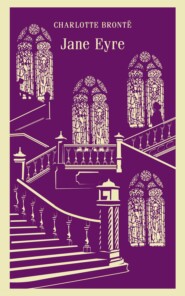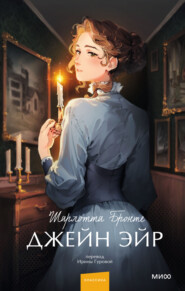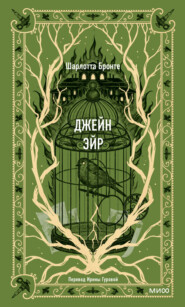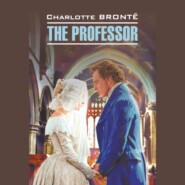По всем вопросам обращайтесь на: info@litportal.ru
(©) 2003-2025.
✖
Джейн Эйр / Jane Eyre
Настройки чтения
Размер шрифта
Высота строк
Поля
I did so. A brief examination convinced me that the contents were less taking than the title. Rasselas looked dull to my trifling taste. I saw nothing about fairies, nothing about genii; no bright variety seemed spread over the closely printed pages. I returned it to her. She received it quietly, and, without saying anything she was about to relapse into her former studious mood. Again I ventured to disturb her:
‘Can you tell me what the writing on that stone over the door means? What is Lowood Institution?’
‘This house where you are come to live.’
‘And why do they call it Institution? Is it in any way different from other schools?’
‘It is partly a charity-school. You and I, and all the rest of us, are charity-children. I suppose you are an orphan. Are not either your father or your mother dead?’
‘Both died before I can remember.’
‘Well, all the girls here have lost either one or both parents, and this is called an institution for educating orphans.’
‘Do we pay no money? Do they keep us for nothing?’
‘We pay, or our friends pay, fifteen pounds a year for each.’
‘Then why do they call us charity-children?’
‘Because fifteen pounds is not enough for board and teaching, and the deficiency is supplied by subscription.’
‘Who subscribes?’
‘Different benevolent-minded ladies and gentlemen in this neighbourhood and in London.’
‘Who was Naomi Brocklehurst?’
‘The lady who built the new part of this house, as that tablet records, and whose son overlooks and directs everything here.’
‘Why?’
‘Because he is treasurer and manager of the establishment.’
‘Then this house does not belong to that tall lady who wears a watch, and who said we were to have some bread and cheese?’
‘To Miss Temple? Oh, no! I wish it did. She has to answer to Mr. Brocklehurst for all she does. Mr. Brocklehurst buys all our food and all our clothes.’
‘Does he live here?’
‘No – two miles off, at a large hall.’
‘Is he a good man?’
‘He is a clergyman, and is said to do a great deal of good.’
‘Did you say that tall lady was called Miss Temple?’
‘Yes.’
‘And what are the other teachers called?’
‘The one with red cheeks is called Miss Smith; she attends to the work, and cuts out – for we make our own clothes, our frocks, and pelisses, and everything; the little one with black hair is Miss Scatcherd; she teaches history and grammar, and hears the second class repetitions; and the one who wears a shawl, and has a pocket-handkerchief tied to her side with a yellow riband, is Madame Pierrot: she comes from Lisle, in France, and teaches French.’
‘Do you like the teachers?’
‘Well enough.’
‘Do you like the little black one, and the Madame —? – I cannot pronounce her name as you do.’
‘Miss Scatcherd is hasty; you must take care not to offend her; Madame Pierrot is not a bad sort of person.’
‘But Miss Temple is the best – isn’t she?’
‘Miss Temple is very good, and very clever; she is above the rest, because she knows far more than they do.’
‘Have you been long here?’
‘Two years.’
‘Are you an orphan?’
‘My mother is dead.’
‘Are you happy here?’
‘You ask rather too many questions. I have given you answers enough for the present. Now I want to read.’
But at that moment the summons sounded for dinner. All re-entered the house. The odour which now filled the refectory was scarcely more appetising than that which had regaled our nostrils at breakfast. The dinner was served in two huge tin-plated vessels, whence rose a strong steam redolent of rancid fat. I found the mess to consist of indifferent potatoes and strange shreds of rusty meat, mixed and cooked together. Of this preparation a tolerably abundant plateful was apportioned to each pupil. I ate what I could, and wondered within myself whether every day’s fare would be like this.
After dinner, we immediately adjourned to the schoolroom. Lessons recommenced, and were continued till five o’clock.
The only marked event of the afternoon was, that I saw the girl with whom I had conversed in the verandah, dismissed in disgrace, by Miss Scatcherd, from a history class, and sent to stand in the middle of the large schoolroom. The punishment seemed to me in a high degree ignominious, especially for so great a girl – she looked thirteen or upwards. I expected she would show signs of great distress and shame; but to my surprise she neither wept nor blushed. Composed, though grave, she stood, the central mark of all eyes. ‘How can she bear it so quietly – so firmly?’ I asked of myself. ‘Were I in her place, it seems to me I should wish the earth to open and swallow me up. She looks as if she were thinking of something beyond her punishment – beyond her situation; of something not round her nor before her. I have heard of day-dreams – is she in a day-dream now? Her eyes are fixed on the floor, but I am sure they do not see it – her sight seems turned in, gone down into her heart. She is looking at what she can remember, I believe; not at what is really present. I wonder what sort of a girl she is – whether good or naughty.’
Soon after five P.M. we had another meal, consisting of a small mug of coffee, and half-a-slice of brown bread. I devoured my bread and drank my coffee with relish; but I should have been glad of as much more – I was still hungry. Half-an-hour’s recreation succeeded, then study; then the glass of water and the piece of oatcake, prayers, and bed. Such was my first day at Lowood.
Chapter VI
The next day commenced as before, getting up and dressing by rushlight; but this morning we were obliged to dispense with the ceremony of washing: the water in the pitchers was frozen. A change had taken place in the weather the preceding evening, and a keen north-east wind, whistling through the crevices of our bedroom windows all night long, had made us shiver in our beds, and turned the contents of the ewers to ice.
Before the long hour and a half of prayers and Bible-reading was over, I felt ready to perish with cold. Breakfast-time came at last, and this morning the porridge was not burnt; the quality was eatable, the quantity small. How small my portion seemed! I wished it had been doubled.
In the course of the day I was enrolled a member of the fourth class, and regular tasks and occupations were assigned me. Hitherto, I had only been a spectator of the proceedings at Lowood, I was now to become an actor therein. At first, being little accustomed to learn by heart, the lessons appeared to me both long and difficult; the frequent change from task to task, too, bewildered me; and I was glad, when, about three o’clock in the afternoon, Miss Smith put into my hands a border of muslin two yards long, together with needle, thimble, &c., and sent me to sit in a quiet corner of the schoolroom, with directions to hem the same. At that hour most of the others were sewing likewise; but one class still stood round Miss Scatcherd’s chair reading, and as all was quiet, the subject of their lessons could be heard, together with the manner in which each girl acquitted herself, and the animadversions or commendations of Miss Scatcherd on the performance. It was English history. Among the readers I observed my acquaintance of the verandah; at the commencement of the lesson, her place had been at the top of the class, but for some error of pronunciation, or some inattention to stops, she was suddenly sent to the very bottom. Even in that obscure position, Miss Scatcherd continued to make her an object of constant notice; she was continually addressing to her such phrases as the following:
‘Burns’ (such it seems was her name; the girls here were all called by their surnames, as boys are elsewhere,) ‘Burns, you are standing on the side of your shoe; turn your toes out immediately.’ ‘Burns, you poke your chin most unpleasantly; draw it in.’ ‘Burns, I insist on your holding your head up; I will not have you before me in that attitude,’ &c. &c.
A Chapter having been read through twice, the books were closed and the girls examined. The lesson had comprised part of the reign of Charles I., and there were sundry questions about tonnage and poundage and ship-money, which most of them appeared unable to answer; still, every little difficulty was solved instantly when it reached Burns; her memory seemed to have retained the substance of the whole lesson, and she was ready with answers on every point. I kept expecting that Miss Scatcherd would praise her attention; but, instead of that, she suddenly cried out:
‘You dirty, disagreeable girl! you have never cleaned your nails this morning!’

















